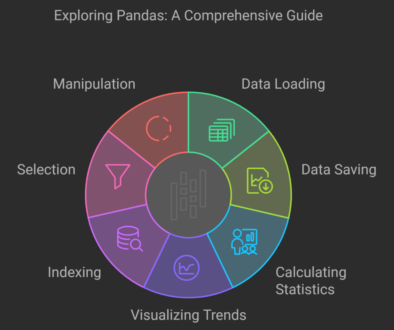SEO: A Comprehensive Guide to Boosting Your Online Visibility
In today’s digital landscape, having a strong online presence is crucial for businesses and individuals alike. One of the most effective ways to increase your visibility on the internet is through Search Engine Optimization (SEO). This comprehensive fundamental learning guide will walk you through the fundamentals of SEO, explain why it’s essential, and provide practical tips to improve your website’s search engine rankings.
What is SEO?
Search Engine Optimization, commonly known as SEO, is the practice of optimizing a website to rank higher in search engine results pages (SERPs) for specific keywords or phrases. The primary goal of SEO is to increase the quantity and quality of organic traffic to your website without relying on paid advertisements.
Why is SEO Important?
In an increasingly competitive online marketplace, SEO has become a critical component of digital marketing strategies. Here’s why businesses invest in SEO:
- Increased Visibility: Higher rankings in search results lead to more visibility for your brand.
- Targeted Traffic: SEO helps attract users who are actively searching for your products or services.
- Cost-Effectiveness: Compared to paid advertising, organic traffic from SEO is more sustainable and cost-effective in the long run.
- Credibility: Users often trust organic search results more than paid advertisements.
According to a study by BrightEdge, organic search drives 53% of website traffic, highlighting the importance of a robust SEO strategy.
Understanding Search Engines
Before diving deeper into SEO techniques, it’s crucial to understand how search engines work. Search engines like Google, Bing, and Yahoo use complex algorithms to crawl, index, and rank web pages. These algorithms consider numerous factors to determine which pages are most relevant and valuable for a given search query.
Key Components of Search Engines:
- Crawlers: Automated bots that discover and scan web pages.
- Indexer: Stores and organizes the information collected by crawlers.
- Ranking Algorithm: Determines the order in which search results are displayed.
The Foundation of SEO: Keywords
Keywords are the building blocks of SEO. They are the terms and phrases that users type into search engines when looking for information, products, or services. Effective keyword research is crucial for developing a successful SEO strategy.
Types of Keywords:
- Short-tail Keywords: Broad, generic terms (e.g., “coffee”).
- Long-tail Keywords: More specific phrases (e.g., “best organic coffee beans for French press”).
- Geo-targeted Keywords: Location-specific terms (e.g., “coffee shops in New York”).
Keyword Research Process:
- Brainstorm Relevant Terms: Start with a list of topics related to your business.
- Use Keyword Research Tools: Utilize tools like Google Keyword Planner, Ubersuggest, or Ahrefs to expand your list and gather data on search volume and competition.
- Analyze Search Volume: Look for keywords with a good balance of search volume and competition.
- Consider User Intent: Choose keywords that align with what your target audience is searching for.
Example: Keyword Research for a Bakery
Let’s say you own a bakery in Chicago. Your keyword research might look like this:
| Keyword | Monthly Search Volume | Competition |
|---|---|---|
| Chicago bakery | 2,900 | High |
| Best cupcakes in Chicago | 480 | Medium |
| Gluten-free bakery Chicago | 320 | Low |
| Custom birthday cakes near me | 1,600 | Medium |
This data helps you identify opportunities to target specific keywords that balance search volume and competition.
On-Page SEO: Optimizing Your Website
On-page SEO refers to the practice of optimizing individual web pages to rank higher and earn more relevant traffic from search engines. Here are key elements of on-page SEO:
1. URL Structure
Create clean, descriptive URLs that include your target keyword.
Example:
- Good:
www.chicagobakery.com/gluten-free-cupcakes - Bad:
www.chicagobakery.com/page1234.html
2. Title Tags
Write compelling title tags that include your primary keyword and stay under 60 characters.
Example: “Delicious Gluten-Free Cupcakes in Chicago | Sweet Treats Bakery”
3. Meta Descriptions
Craft engaging meta descriptions that summarize your page content and include your target keyword. Keep them under 160 characters.
Example: “Indulge in our mouth-watering gluten-free cupcakes, freshly baked daily in Chicago. Order online or visit our bakery for a sweet, guilt-free treat!”
4. Header Tags (H1, H2, H3)
Use header tags to structure your content and include variations of your target keyword.
Example:
<h1>Gluten-Free Cupcakes in Chicago</h1>
<h2>Our Delicious Flavors</h2>
<h3>Chocolate Delight</h3>
<h3>Vanilla Dream</h3>
<h2>Why Choose Our Gluten-Free Cupcakes?</h2>5. Content Optimization
Create high-quality, relevant content that addresses user intent and naturally incorporates your target keywords. Aim for a minimum of 300 words per page, but remember that longer, in-depth content often performs better in search results.
6. Image Optimization
Optimize images by:
- Using descriptive file names (e.g.,
gluten-free-chocolate-cupcake.jpg) - Adding alt text that includes your target keyword
- Compressing images to improve page load speed
7. Internal Linking
Link to other relevant pages on your website to help search engines understand your site structure and spread link equity.
Example: In a blog post about cupcake flavors, you might link to your “Custom Orders” page.
Off-Page SEO: Building Authority
Off-page SEO involves activities conducted outside of your website to improve its search engine rankings. The primary focus of off-page SEO is building high-quality backlinks.
Backlinks
Backlinks are links from other websites to your site. They act as “votes of confidence” in the eyes of search engines. The quality and relevance of these links are more important than quantity.
Strategies for Building Backlinks:
- Create Linkable Assets: Develop high-quality content that others will want to link to, such as infographics, research studies, or comprehensive guides.
- Guest Blogging: Write articles for reputable websites in your industry.
- Local Business Directories: List your business in relevant online directories.
- Social Media Engagement: While social media signals aren’t direct ranking factors, they can increase your content’s visibility and lead to more backlinks.
Technical SEO: Enhancing Website Performance
Technical SEO ensures that search engines can crawl, index, and render your website effectively. Key aspects of technical SEO include:
- Site Speed: Optimize your website’s loading time. According to Google, 53% of mobile users abandon sites that take longer than 3 seconds to load.
- Mobile-Friendliness: Ensure your website is responsive and provides a good user experience on mobile devices.
- XML Sitemap: Create and submit an XML sitemap to help search engines understand your site structure.
- Robots.txt: Use a robots.txt file to guide search engine crawlers on which parts of your site to index.
- HTTPS: Secure your website with SSL certification to protect user data and improve trust signals.
Measuring SEO Success
To gauge the effectiveness of your SEO efforts, monitor these key performance indicators (KPIs):
- Organic Traffic: Track the number of visitors coming to your site through organic search.
- Keyword Rankings: Monitor your positions for target keywords in search results.
- Conversion Rate: Measure the percentage of visitors who complete desired actions on your site.
- Bounce Rate: Analyze the percentage of visitors who leave your site after viewing only one page.
- Page Load Time: Keep an eye on how quickly your pages load, as this affects both user experience and rankings.
Use tools like Google Analytics and Google Search Console to track these metrics and gain insights into your SEO performance.
Conclusion
Search Engine Optimization is a complex and ever-evolving field, but mastering its fundamentals can significantly boost your online visibility and drive valuable traffic to your website. By focusing on keyword research, on-page optimization, quality content creation, and building authoritative backlinks, you can improve your search engine rankings and attract more potential customers.
Remember that SEO is a long-term strategy that requires patience and consistent effort. Stay up-to-date with the latest SEO trends and algorithm updates to ensure your website remains competitive in search results. With dedication and the right approach, you can harness the power of SEO to grow your online presence and achieve your business goals.




How to Register an Account on Binance
October 28, 2024 @ 1:21 pm
Thanks for this very informative article! For anyone looking for a detailed step-by-step guide on creating a Binance account, here’s a helpful resource I found: How to Register an Account on Binance. Hope it’s useful!
create binance account
November 2, 2024 @ 11:15 pm
How to Register an Account on Binance https://www.binance.com/en/square/post/15710503553490?ref=775587485
📒 Sending a transfer from our company. Confirm >>> https://telegra.ph/Go-to-your-personal-cabinet-08-25?hs=bb68e8a84f664f09215bd1375c6322b8& 📒
November 26, 2024 @ 3:56 pm
ybugzc
Hello
March 23, 2025 @ 6:09 am
gqiNaXnt pJnc NtjQ eQuDde xqhl RLyFAx OJcz
jalalive
April 12, 2025 @ 7:17 am
Really enjoyed this! Your writing style is so engaging.
jala live
April 12, 2025 @ 9:28 am
This gave me a lot to think about—thank you for sharing your thoughts!
jalalive
April 12, 2025 @ 10:09 am
Clear, concise, and super helpful. Great job!”
jalalive apk
April 12, 2025 @ 11:55 am
Always a pleasure reading your blog. Keep the great content coming!
jalalive
April 12, 2025 @ 1:36 pm
Thanks for the great read! Very informative and well-written.
spotbet login
April 12, 2025 @ 4:03 pm
Really helpful content — I learned a lot from this!
jalalive88
April 12, 2025 @ 5:37 pm
Great post! I really enjoyed reading this. Your insights were clear and helpful — thanks for sharing!
jalalive
April 13, 2025 @ 12:56 am
Really helpful content – thanks for putting this together!
jalalive55
April 13, 2025 @ 1:40 am
This was a great read! I learned something new today.
İstanbul su tesisatı kaçak tespiti
April 24, 2025 @ 1:17 am
İstanbul su tesisatı kaçak tespiti Profesyonel ekipler, en küçük kaçakları bile tespit edebilir. https://thenypr.com/2022/12/21/umraniye-petek-temizleme-faydalari/
Şile su kaçak tespiti
April 24, 2025 @ 3:24 pm
Şile su kaçak tespiti Tavsiye Ediyorum: Herkese gönül rahatlığıyla tavsiye edebileceğim bir ekip. https://biswabanglanews.com/2012/10/18/uskudar-tesisatci-tikali-lavabo-acma/
Beylikdüzü su kaçağı tespiti
April 25, 2025 @ 2:20 pm
Beylikdüzü su kaçağı tespiti Beylikdüzü’ndeki evimizdeki su kaçağını bulmaları çok zordu, ama çok başarılı oldular. http://www.barbaramusso.it/umraniye-petek-temizleme/
Soğanlık su kaçak tespiti
April 26, 2025 @ 8:15 pm
Soğanlık su kaçak tespiti Profesyonel Yaklaşım: Su kaçağı tespiti için kullandıkları cihazlar gerçekten son teknoloji. Hiçbir yere zarar vermeden problemi buldular. http://ruffeodrive.com/?p=34460
su kaçak tespit cihazı
April 27, 2025 @ 12:25 am
su kaçak tespit cihazı Tesisat firmasının profesyonelliği bizi çok etkiledi. Modern cihazlarla su kaçağının yerini hızlıca buldular. Sevgi M. http://ruffeodrive.com/uskudar-tesisatci-petek-temizleme/
Altunizade su kaçak tespiti
April 27, 2025 @ 12:52 am
Altunizade su kaçak tespiti Su kaçağı sadece maddi değil, aynı zamanda çevresel bir sorundur. https://barauditoriump2.com/?p=192304
Maltepe su kaçak tespiti
April 27, 2025 @ 1:13 am
Maltepe su kaçak tespiti Su lekeleri, potansiyel bir kaçağın ilk görünür işaretidir. https://www.jlifenj.com/?p=40838
su kaçağı bulma
April 27, 2025 @ 4:36 am
su kaçağı bulma İstanbul’un en iyi su kaçağı tespit firmalarından biri. Kesinlikle öneriyorum. https://worldknowledge.wiki/?p=21416
OlasxTig
April 30, 2025 @ 3:32 am
заработок на аккаунтах заработок на аккаунтах
SDiozxsTig
April 30, 2025 @ 4:35 am
магазин аккаунтов социальных сетей платформа для покупки аккаунтов
Kumburgaz su kaçak tespiti
April 30, 2025 @ 7:15 am
Kumburgaz su kaçak tespiti Profesyonel ekipmanlar, gizli kaçakları açığa çıkarır. https://helpdesk.rikor.com/?p=366272
SDiozxsTig
April 30, 2025 @ 11:45 am
профиль с подписчиками маркетплейс аккаунтов соцсетей
DrosTig
April 30, 2025 @ 5:59 pm
магазин аккаунтов гарантия при продаже аккаунтов
JosephTig
April 30, 2025 @ 6:52 pm
заработок на аккаунтах маркетплейс для реселлеров
Robertelory
April 30, 2025 @ 9:02 pm
маркетплейс аккаунтов соцсетей купить аккаунт
OliveTig
May 1, 2025 @ 2:24 pm
магазин аккаунтов https://birzha-akkauntov-online.ru/
Peterduh
May 1, 2025 @ 2:46 pm
магазин аккаунтов купить аккаунт
RichardNep
May 1, 2025 @ 3:04 pm
купить аккаунт с прокачкой платформа для покупки аккаунтов
JamesDaype
May 1, 2025 @ 3:28 pm
маркетплейс аккаунтов соцсетей https://ploshadka-prodazha-akkauntov.ru/
OliveTig
May 2, 2025 @ 1:51 am
покупка аккаунтов гарантия при продаже аккаунтов
BryantJoura
May 2, 2025 @ 2:17 am
продать аккаунт магазин аккаунтов
RichardNep
May 2, 2025 @ 2:23 am
купить аккаунт с прокачкой маркетплейс для реселлеров
DavidMog
May 2, 2025 @ 8:25 pm
Find Accounts for Sale Account Selling Service
Jasonreill
May 2, 2025 @ 8:25 pm
Buy accounts Marketplace for Ready-Made Accounts
MichaelToift
May 2, 2025 @ 8:49 pm
Account Selling Service Account Acquisition
WalterBrefs
May 2, 2025 @ 9:03 pm
Guaranteed Accounts Purchase Ready-Made Accounts
JaredMiz
May 3, 2025 @ 2:10 pm
Database of Accounts for Sale Account Market
BrianEmare
May 3, 2025 @ 2:13 pm
Sell Pre-made Account Social media account marketplace
RonaldSah
May 3, 2025 @ 2:26 pm
Accounts for Sale Website for Buying Accounts
Thomasdrorm
May 3, 2025 @ 2:51 pm
Website for Selling Accounts Account Selling Service
Brucetup
May 4, 2025 @ 1:02 am
Account Catalog Secure Account Purchasing Platform
WilliamVer
May 4, 2025 @ 1:03 am
Gaming account marketplace Database of Accounts for Sale
RonaldSah
May 4, 2025 @ 3:07 am
Account Buying Service Account Acquisition
EdmundWen
May 4, 2025 @ 5:59 pm
account trading account exchange service
BrandonLit
May 4, 2025 @ 6:03 pm
secure account purchasing platform account acquisition
Romeonaize
May 4, 2025 @ 6:17 pm
account trading platform accounts for sale
KeithFoxia
May 5, 2025 @ 1:23 pm
account catalog account acquisition
RobertBop
May 5, 2025 @ 1:31 pm
account buying service profitable account sales
HectorDooca
May 5, 2025 @ 1:45 pm
account buying service marketplace for ready-made accounts
Carlosfaura
May 5, 2025 @ 2:18 pm
buy and sell accounts accounts market
RichardTof
May 6, 2025 @ 12:21 am
marketplace for ready-made accounts account purchase
Stephenunems
May 6, 2025 @ 12:22 am
accounts market online account store
Carlostom
May 6, 2025 @ 2:24 am
account trading buy and sell accounts
jalalive gratis
May 6, 2025 @ 6:56 am
Well written and inspiring! Keep up the great work.
Stevendaf
May 6, 2025 @ 9:38 am
buy pre-made account database of accounts for sale
Clyderen
May 6, 2025 @ 3:28 pm
verified accounts for sale account selling service
Johnnydor
May 6, 2025 @ 3:28 pm
secure account purchasing platform account store
ThomasEvege
May 6, 2025 @ 3:45 pm
guaranteed accounts database of accounts for sale
PhilipViome
May 7, 2025 @ 1:48 am
accounts marketplace buy accounts
RandalSouby
May 7, 2025 @ 1:50 am
secure account purchasing platform account trading platform
jalalive
May 7, 2025 @ 4:08 am
Thanks for sharing! I learned something new today.
ZacharyViats
May 7, 2025 @ 12:02 pm
find accounts for sale accounts market
Richardhew
May 7, 2025 @ 12:03 pm
account trading best-social-accounts.org
KevinPycle
May 7, 2025 @ 12:20 pm
find accounts for sale marketplace for ready-made accounts
بينانس
May 7, 2025 @ 6:05 pm
كيفية التسجيل في بينانس وتفعيل الحساب https://accounts.binance.com/ar/register/person?ref=775587485
ThomasWolla
May 8, 2025 @ 2:04 am
verified accounts for sale account acquisition
Nathanfug
May 8, 2025 @ 2:07 am
account selling service account market
Brucesearo
May 8, 2025 @ 2:26 am
verified accounts for sale https://discount-accounts.org
Danielbrift
May 8, 2025 @ 1:04 pm
account buying platform website for buying accounts
GeraldFarne
May 8, 2025 @ 1:46 pm
verified accounts for sale social media account marketplace
JasonNoisy
May 8, 2025 @ 5:00 pm
account buying service account catalog
ThomasSwats
May 8, 2025 @ 5:22 pm
sell account online account store
accounts-offer.org_Dyday
May 9, 2025 @ 3:40 pm
ready-made accounts for sale https://accounts-offer.org
accounts-marketplace.xyz_Dyday
May 9, 2025 @ 3:45 pm
account exchange https://accounts-marketplace.xyz/
buy-best-accounts.org_Dyday
May 9, 2025 @ 4:01 pm
account acquisition https://buy-best-accounts.org
accounts-marketplace.live_Ovediup
May 10, 2025 @ 2:54 am
verified accounts for sale account marketplace
social-accounts-marketplace.xyz_Ovediup
May 10, 2025 @ 2:56 am
website for selling accounts https://social-accounts-marketplace.xyz
buy-accounts.space_Ovediup
May 10, 2025 @ 3:14 am
website for buying accounts accounts marketplace
buy-accounts-shop.pro_Ovediup
May 10, 2025 @ 2:33 pm
account selling service https://buy-accounts-shop.pro
accounts-marketplace.art_Ovediup
May 10, 2025 @ 2:41 pm
secure account purchasing platform https://accounts-marketplace.art
buy-accounts.live_Ovediup
May 10, 2025 @ 6:40 pm
account catalog https://buy-accounts.live
accounts-marketplace.online_Ovediup
May 10, 2025 @ 6:50 pm
buy pre-made account https://accounts-marketplace.online
accounts-marketplace-best.pro_Dyday
May 11, 2025 @ 2:22 pm
account marketplace https://accounts-marketplace-best.pro
akkaunty-na-prodazhu.pro_Ovediup
May 12, 2025 @ 12:32 am
площадка для продажи аккаунтов https://akkaunty-na-prodazhu.pro
kupit-akkaunt.xyz_Ovediup
May 12, 2025 @ 12:52 am
продать аккаунт https://kupit-akkaunt.xyz/
rynok-akkauntov.top_Ovediup
May 12, 2025 @ 12:55 am
маркетплейс аккаунтов https://rynok-akkauntov.top
bitcoin accelerator
May 12, 2025 @ 2:21 am
Bitcoin Accelerator This tool is designed to prioritize your transaction, ensuring it gets confirmed faster on the network. It’s an essential resource for anyone looking to optimize their Bitcoin experience. Don’t let slow confirmations hold you back; discover the benefits of using an accelerator today!
akkaunt-magazin.online_Ovediup
May 12, 2025 @ 3:41 pm
площадка для продажи аккаунтов akkaunt-magazin.online
akkaunty-market.live_Ovediup
May 12, 2025 @ 3:49 pm
купить аккаунт akkaunty-market.live
kupit-akkaunty-market.xyz_Ovediup
May 12, 2025 @ 4:08 pm
покупка аккаунтов https://kupit-akkaunty-market.xyz/
binance
May 12, 2025 @ 10:24 pm
akkaunty-optom.live_Ovediup
May 13, 2025 @ 1:27 pm
маркетплейс аккаунтов https://akkaunty-optom.live/
online-akkaunty-magazin.xyz_Ovediup
May 13, 2025 @ 1:43 pm
маркетплейс аккаунтов https://online-akkaunty-magazin.xyz
akkaunty-dlya-prodazhi.pro_Ovediup
May 13, 2025 @ 1:54 pm
купить аккаунт купить аккаунт
kupit-akkaunt.online_Ovediup
May 14, 2025 @ 12:53 am
купить аккаунт https://kupit-akkaunt.online
binance
May 14, 2025 @ 10:21 am
spotbet
May 15, 2025 @ 8:23 am
Great insights! This really gave me a new perspective. Thanks for sharing.
buy-adsaccounts.work_Ovediup
May 15, 2025 @ 7:00 pm
facebook accounts for sale facebook account sale
buy-ad-accounts.click_Ovediup
May 15, 2025 @ 7:12 pm
buy ad account facebook https://buy-ad-accounts.click
buy-ad-account.top_Ovediup
May 15, 2025 @ 7:17 pm
buying fb accounts buy facebook account
buy-ads-account.click_Ovediup
May 15, 2025 @ 8:40 pm
facebook ad account buy facebook ad accounts for sale
ad-account-buy.top_Ovediup
May 16, 2025 @ 1:34 pm
buy facebook ads account buy facebook accounts for ads
buy-ads-account.work_Ovediup
May 16, 2025 @ 1:39 pm
buy facebook profile facebook accounts to buy
ad-account-for-sale.top_Ovediup
May 16, 2025 @ 1:53 pm
buy facebook old accounts https://ad-account-for-sale.top
buy-ad-account.click_Ovediup
May 16, 2025 @ 6:58 pm
buying facebook ad account https://buy-ad-account.click/
Ralpheaset
May 17, 2025 @ 4:11 am
Эта статья предлагает живое освещение актуальной темы с множеством интересных фактов. Мы рассмотрим ключевые моменты, которые делают данную тему важной и актуальной. Подготовьтесь к насыщенному путешествию по неизвестным аспектам и узнайте больше о значимых событиях.
Подробнее можно узнать тут – https://medalkoblog.ru/
ad-accounts-for-sale.work_Ovediup
May 17, 2025 @ 1:36 pm
buy aged facebook ads accounts buy facebook accounts for ads
buy-ads-account.top_Ovediup
May 17, 2025 @ 1:58 pm
google ads account seller buy old google ads account
buy-ads-accounts.click_Ovediup
May 17, 2025 @ 2:14 pm
buy verified google ads accounts https://buy-ads-accounts.click
buy-ad-account.click_Ovediup
May 17, 2025 @ 2:45 pm
buy facebook advertising accounts https://buy-accounts.click/
ads-account-for-sale.top_Ovediup
May 18, 2025 @ 12:24 am
google ads account buy buy google adwords account
ads-account-buy.work_Ovediup
May 18, 2025 @ 12:27 am
buy aged google ads accounts buy google adwords account
buy-ads-invoice-account.top_Ovediup
May 18, 2025 @ 11:32 am
old google ads account for sale https://buy-ads-invoice-account.top/
buy-account-ads.work_Ovediup
May 18, 2025 @ 11:40 am
buy google ads account https://buy-account-ads.work
buy-ads-agency-account.top_Ovediup
May 18, 2025 @ 11:47 am
buy verified google ads accounts https://buy-ads-agency-account.top
sell-ads-account.click_Ovediup
May 18, 2025 @ 12:43 pm
buy google ads https://sell-ads-account.click
buy-verified-ads-account.work_Ovediup
May 19, 2025 @ 12:04 am
old google ads account for sale buy verified google ads account
buy-business-manager.org_Ovediup
May 19, 2025 @ 12:05 am
buy facebook business manager accounts buy-business-manager.org
ads-agency-account-buy.click_Ovediup
May 19, 2025 @ 12:19 am
buy google ads threshold accounts https://ads-agency-account-buy.click
buy-business-manager-acc.org_Ovediup
May 19, 2025 @ 2:40 pm
fb bussiness manager buy-business-manager-acc.org
buy-bm-account.org_Ovediup
May 19, 2025 @ 5:12 pm
buy business manager account https://buy-bm-account.org/
buy-verified-business-manager-account.org_Ovediup
May 19, 2025 @ 9:48 pm
buy business manager account https://buy-verified-business-manager-account.org/
buy-verified-business-manager.org_Ovediup
May 19, 2025 @ 9:49 pm
facebook business manager account buy https://buy-verified-business-manager.org/
business-manager-for-sale.org_Ovediup
May 20, 2025 @ 12:37 pm
verified business manager for sale https://business-manager-for-sale.org
buy-business-manager-verified.org_Ovediup
May 20, 2025 @ 12:38 pm
buy bm facebook buy-business-manager-verified.org
buy-bm.org_Ovediup
May 20, 2025 @ 12:53 pm
buy business manager facebook unlimited bm facebook
buy-business-manager-accounts.org_Ovediup
May 21, 2025 @ 1:24 am
buy verified facebook business manager https://buy-business-manager-accounts.org/
buy-tiktok-ads-account.org_Ovediup
May 21, 2025 @ 1:26 am
buy tiktok business account https://buy-tiktok-ads-account.org
tiktok-ads-account-buy.org_Ovediup
May 21, 2025 @ 1:40 am
tiktok ad accounts https://tiktok-ads-account-buy.org
tiktok-ads-account-for-sale.org_Ovediup
May 21, 2025 @ 3:16 pm
tiktok ads account buy buy tiktok ads account
tiktok-agency-account-for-sale.org_Ovediup
May 21, 2025 @ 3:21 pm
tiktok agency account for sale https://tiktok-agency-account-for-sale.org
buy-tiktok-ad-account.org_Ovediup
May 21, 2025 @ 3:26 pm
tiktok ads agency account https://buy-tiktok-ad-account.org
buy-tiktok-ads-accounts.org_Ovediup
May 21, 2025 @ 4:42 pm
tiktok ads account buy https://buy-tiktok-ads-accounts.org
buy-tiktok-business-account.org_Ovediup
May 22, 2025 @ 2:29 pm
buy tiktok ads accounts https://buy-tiktok-business-account.org
buy-tiktok-ads.org_Ovediup
May 22, 2025 @ 2:29 pm
buy tiktok ads https://buy-tiktok-ads.org
tiktok-ads-agency-account.org_Ovediup
May 22, 2025 @ 2:49 pm
buy tiktok ads accounts https://tiktok-ads-agency-account.org
código de Binance
June 2, 2025 @ 11:09 pm
Thank you for your sharing. I am worried that I lack creative ideas. It is your article that makes me full of hope. Thank you. But, I have a question, can you help me?
Premia polecajacego Binance
June 5, 2025 @ 7:47 pm
Thanks for sharing. I read many of your blog posts, cool, your blog is very good.
Arnavutköy Merkez su kaçak tespiti
June 9, 2025 @ 7:18 pm
Arnavutköy Merkez su kaçak tespiti Beykoz’daki evimdeki su kaçağını buldular ve kısa sürede onardılar. Hizmetlerinden çok memnunum. https://orgelportal.ch/author/kacak/
tıkanıklık açma ve su kaçak tespiti
June 10, 2025 @ 6:50 am
tıkanıklık açma ve su kaçak tespiti Şişli su kaçağı tespiti: Şişli bölgesinde güvenilir su kaçağı tespit hizmetleri. https://www.friend007.com/read-blog/82081
Gaziosmanpaşa su kaçak tespiti
June 11, 2025 @ 3:41 am
Gaziosmanpaşa su kaçak tespiti Yüksek teknolojili ekipmanlarıyla kısa sürede sorunu çözdüler, teşekkürler! https://drumevauto.com/author/kacak/
Küçüksu su kaçak tespiti
June 11, 2025 @ 1:31 pm
Küçüksu su kaçak tespiti Mutfaktaki su sızıntısının kaynağını termal kamerayla buldular. Tezgaha zarar vermeden tamir ettiler. Şükran D. http://riotstories.co.uk/author/kacak/
Kavacık su kaçak tespiti
June 12, 2025 @ 1:24 am
Kavacık su kaçak tespiti Tuvaletteki gizli kaçağı termal kamerayla hemen buldular. İşlerini çok temiz yaptılar, hiç dağınıklık olmadı. Kemal A. https://tortik.ck.ua/author/kacak/
Beylerbeyi su kaçak tespiti
June 12, 2025 @ 8:45 pm
Beylerbeyi su kaçak tespiti İşlerinde Usta: Gerçekten işlerinde ustalar. Teşekkür ederiz. https://aipair.io/read-blog/5005
Registrera dig
June 13, 2025 @ 8:31 pm
Thanks for sharing. I read many of your blog posts, cool, your blog is very good.
Sign Up
June 22, 2025 @ 9:29 pm
I don’t think the title of your article matches the content lol. Just kidding, mainly because I had some doubts after reading the article.
Fenerbahçe su kaçağı tespiti
June 23, 2025 @ 2:12 am
Fenerbahçe su kaçağı tespiti Suadiye su kaçağı tespiti: Suadiye’de su kaçağı sorunlarına son veren çözümler. https://zekond.com/read-blog/188346
olmrg
July 8, 2025 @ 3:25 pm
amoxicillin buy online – cheap amoxicillin generic order generic amoxil
6vy66
July 8, 2025 @ 4:55 pm
purchase amoxicillin generic – comba moxi buy amoxicillin generic
bfcey
July 9, 2025 @ 10:11 am
buy diflucan 200mg – https://gpdifluca.com/ order fluconazole 200mg
6anj1
July 9, 2025 @ 4:57 pm
fluconazole over the counter – this diflucan 200mg usa
Index Home
July 10, 2025 @ 3:28 am
Thank you, your article surprised me, there is such an excellent point of view. Thank you for sharing, I learned a lot.
nqmy1
July 10, 2025 @ 4:45 pm
buy escitalopram 20mg online – lexapro 10mg pill lexapro 10mg usa
41k6y
July 10, 2025 @ 11:52 pm
order cenforce 50mg generic – order cenforce 100mg for sale cenforce pill
pv58n
July 11, 2025 @ 6:15 am
cenforce 100mg generic – buy cenforce 50mg without prescription brand cenforce 50mg